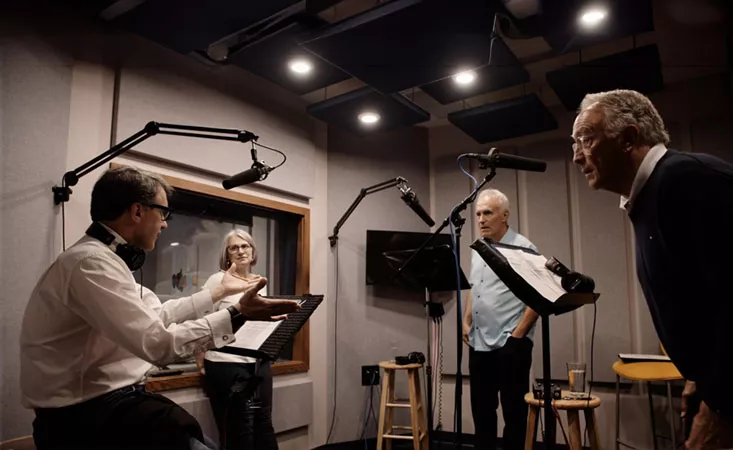
Host Jon Hallberg, MD, and guests record an episode for the "First Line of Defense" podcast series.
A new podcast series aims to educate primary care providers about the risk factors and symptoms that often come before a diagnosis of pancreatic cancer. The goal for the podcast, called “The First Line of Defense: Primary Care Clinicians and Early Detection of Pancreatic Cancer,” is to offer continuing education to healthcare professionals so that they can detect the disease earlier, giving patients an improved chance at survival.
Barbara Kenner, PhD, a member of PanCAN’s Board of Directors and founder of Kenner Family Research Fund, calls this group of clinicians the “gatekeepers for the disease,” as they are typically the first point of contact for people experiencing symptoms – like back pain and digestion issues – that are often misdiagnosed and sometimes even dismissed in patients later diagnosed with pancreatic cancer.
Barbara lived through this experience when her husband, Peter, sought help for symptoms that turned out to be a pancreatic neuroendocrine tumor (PNET). He died in 2010, just two short months after his diagnosis.
After his death, she wanted to understand what could be done to diagnose patients earlier.
“I started looking at the literature,” she said. “And then I started seeing over the years all these pieces of evidence that came up about back pain and stomach pain, fatigue, weight loss, and the new diagnosis of diabetes.”
When she talked with Peter’s internist, he urged her to continue digging into the research and to figure out a way to reach clinicians.
“He told me, ‘Go out and find me a way to detect this disease early. I need something in my toolbox.’”
For years, the Kenner Family Research Fund (KFRF) has organized conferences and workshops bringing researchers and healthcare professionals together to share knowledge related to pancreatic cancer. Barbara also serves on the steering committee for PanCAN’s Early Detection Initiative, a study looking at the link between new-onset diabetes and pancreatic cancer. PanCAN President and CEO Julie Fleshman, JD, MBA, said Barbara’s long-standing commitment to improving outcomes for patients with pancreatic cancer continues to make a difference.
“We are so inspired by the passion that members of our Board of Directors bring to the cause,” she said. “Barbara is an incredible example – this is innovative work that reaches clinicians who can change the course of this disease for so many patients.”
For Barbara, the podcast series is the next evolution of the Kenner Family Research Fund’s focus on early detection. Why a podcast? Because research shows that podcasts are one of the fastest growing ways to provide medical information to practitioners. Although Barbara laughed that she’s “not a podcast maven,” she quickly partnered with the right people. Her daughter, who works in social media marketing, introduced her to the non-profit organization Entertainment 2 Affect Change (e2ac). They enthusiastically said yes to the project, recognizing the importance of the work.
“We knew that there were different categories that we wanted to cover,” Barbara said. “We knew in the first episode we wanted to just focus on symptoms and risk factors, and pull that apart, and let clinicians know what their next steps should be. Then we wanted to look at genetics and family history because even though only about 10% of pancreatic cancer cases have a familial or genetic link, it’s an identifiable group that may be at higher risk.”
From there, the series moves into the future of early detection of pancreatic cancer and how technology may play an increasingly pivotal role in diagnosis. The last episode features an interview with Dr. Chris Sander, a computational biologist and researcher focused on using artificial intelligence to better predict pancreatic cancer.
The series’ host, Jon Hallberg, MD, is a well-known medical podcast host and a family practitioner – the exact combination KFRF was looking for to guide the conversation.
Also integrated into episodes: the patient voice. Brothers Steve and Scott Nelson share how Scott’s pancreatic cancer diagnosis – and their family history of a BRCA2 mutation – led to Steve being regularly screened. As a result, Steve found his own pancreatic cancer early and had a successful surgery, showing the life-saving value of early detection.
The team hopes to dig into many more topics, including how race, ethnicity and socioeconomic factors may relate to early detection of pancreatic cancer. For example, we know that Black Americans are more likely to be diagnosed with pancreatic cancer than any other racial or ethnic group, but we don’t yet understand the cause of this disparity. Factors related to systemic racism, the environment, access to nutritious food and barriers to quality healthcare may play a role.
“It’s critical for primary care doctors to understand these differences exist – the bigger picture is awareness,” Barbara said.
Awareness is critical to achieve the ultimate goal: Decrease the number of people who are diagnosed with pancreatic cancer late stage. If more people are diagnosed early, they’ll have a better chance of survival. Right now, there’s evidence that patients with early-stage or localized pancreatic cancer are living longer with available treatments. The five-year survival for disease that is localized is over 44% versus only 3% for those patients diagnosed with distant disease. Unfortunately, only 13% of pancreatic cancers are localized.
“How do we reduce the number of people diagnosed late and catch pancreatic cancer when it is more treatable?” Barbara asked. “We need to reach the gatekeepers, the primary care clinicians, to increase their awareness of the risk factors and subtle symptoms related to the disease.”
Help spread the word about this new resource for medical professionals! Listen to the podcast series wherever you get your podcasts and consider sharing the episodes with your primary care clinician.














